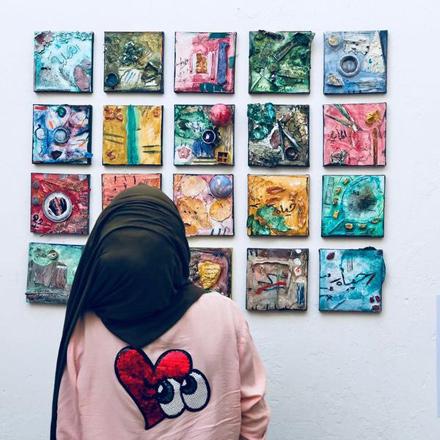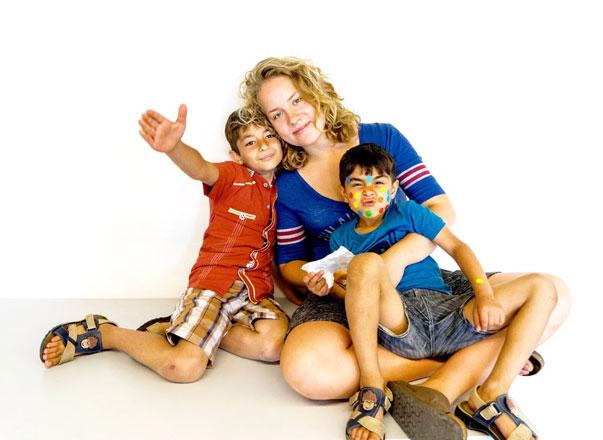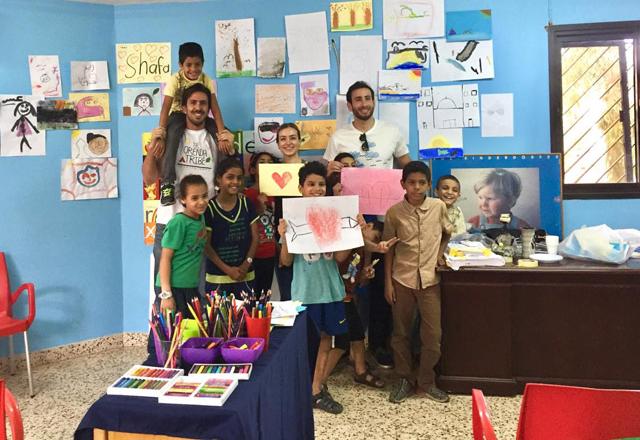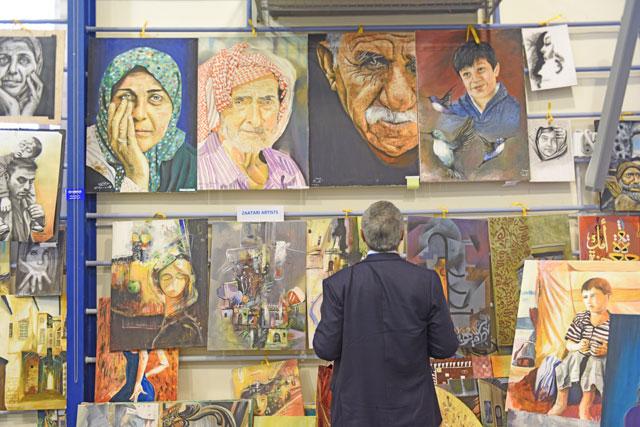You are here
Girls at Jerash refugee camp unleash darkness on canvases
By Camille Dupire - Aug 28,2018 - Last updated at Aug 28,2018

A visitor of the exhibition looks at the work of the young refugee girls recently (Photo courtesy of The Orenda Tribe)
AMMAN — For Fatima Omar, an art educator and writer from Abu Dhabi, creating a change in society does not always come from financial or material empowerment — it can be firstly intellectual, by turning people's weaknesses into strengths, thus triggerring a change in society.
Currently working with Abu Dhabi's Department of Culture and Tourism, Omar recently conducted a two-week art workshop at Jerash refugee camp, where she taught 12 young girls how to unleash their emotions through art in partnership with local organisation The Orenda Tribe.
"When I was a teenager, I struggled to find myself, to even express myself without fearing my family, traditions, or bad reputation," she told The Jordan Times in a recent interview, remembering: "I had to hide behind many masks because I felt ashamed of my thoughts and my difference."
She said the lack of acceptance for her personal views created "a huge lack of confidence in herself". "I wish I could have been heard and guided rather than judged and punished," Omar explained, stressing that this vision has been one of the main inspirations behind her current work.
Describing herself as "an expressionist rather than an art therapist", she has been working with juveniles in Abu Dhabi prisons, young refugees and girls from underprivileged communities, with the aim of "providing them with the means to express their emotions and darkest, most fearful feelings".
For Zaid Souqi, who founded the social enterprise The Orenda Tribe with the aim of using art to empower people and break barriers between communities, this event was “a great success”.
“For me, what was special about the exhibition that came out of the workshops was the dialogue. Dialogue between the artists from the camp and the attendees, between people from different background and even a dialogue that started a small quarrel and ended up in an even stronger dialogue that shortened the gap between two different mentalities,” Souqi stated, stressing that he believes the dialogue “breaks barriers between communities”.
“Families often fear the unknown. They blame themselves for having a child that doesn’t follow their way of thinking,” Omar remarked, adding that “parents fear difference because they feel guilty that it happened so they simply and forcefully, reject it”.
She said her artistic workshops, and the exhibition helped show acceptance among the camp’s population.
“I want to create an environment for these teenage girls where mistakes are only experiences that everyone is allowed to go through and learn from,” Omar explained, noting that she strives to give the youth “the power to speak their minds and the comfort of understanding and knowing exactly how they feel”.
“I am not spreading positive quotes and sunshine, I am using pain and sadness and anger to empower,” the educator stressed, explaining: “Once we understand the core of our pain, we will know how to control ourselves and once we gain that control we will know our strength.”
Asked about the main challenges she faces in her journey, she cited people's scepticism about their own artistic skills. "People are used to 'beautiful art'. When someone introduces expressive art, they become defensive and think that what they’re making could be looked at as ugly," Omar highlighted, saying that "it takes time to let everyone understand that feelings don’t have to be beautiful but honest and heartfelt".
She recalled one of the participants coming up to her telling: “I didn’t think I could do this.” “This is honestly an achievement: To create a bond and gain trust and make people know they are not alone in their heads," Omar stressed.
The educator has been using her artistic background to tackle controversial subjects such as rape, suicide, death, or abuse. In spite of the reactions of rejection, recalculation, or reflection it brought up in the public, she underlined the necessity to listen to such “dark emotions”.
"I realised that the most beautiful thing is that there’s no right or wrong in this. Everyone is entitled to how they feel and no one can tell a person how they should feel about something. However, it is important to listen, understand and embrace," she underscored.
“I want to spread the language of art because I believe in its power to change,” Omar concluded.
Related Articles
AMMAN — Inspired by her worldwide travels that took her from her native Poland to the bustling streets of Dakar and the souks of Morroco, yo
AMMAN — When searching for ways to help underprivileged children in his country, Zaid Souqi, founder of the Orenda Tribe, ”did not wan
AMMAN — “Participating in this market helped me get exposure for my art, as not many people can come inside the camp to see it,” said Moayad














